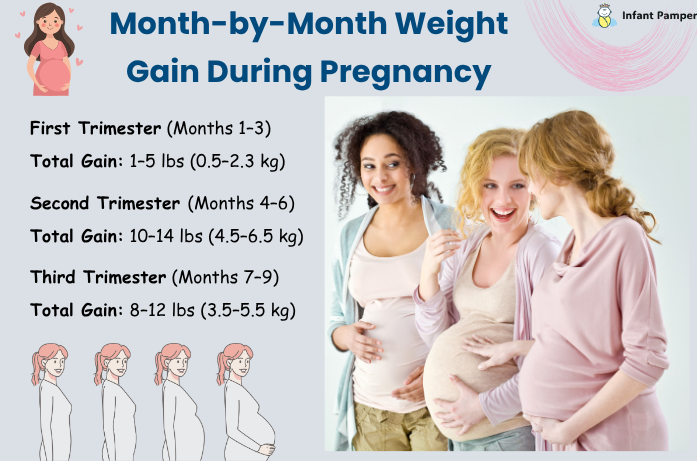By a Caring Mom at Infant Pamper
Pregnancy is an incredible adventure to experience, one of the least expected being the gain of weight. As your baby develops, your full body changes, and one of the most evident signs of this is the increasing number on the weight scale.
However, not all weight gain is equal. Questions like these will probably cross your mind:
How much Weight Gain During Pregnancy?
Is my weight gain this month good?
What if I gain too much or too little?
Indeed, you are not the only one who is wondering. Let us help you by showing you all the facts through a pregnancy weight gain guide month-by-month, which will include what is healthy and what to expect plus the best ways to stay balanced and nourished during the whole process.
Why Pregnancy Weight Gain Matters
Weight gain in pregnancy does not equal only fat, it comprises baby, placenta, and extra blood, fluids, and breast tissue too. It is a way of supporting:
- Your baby’s development
- The placenta and amniotic fluid
- Your growing uterus and breasts
- Fat stores for breastfeeding
Too little weight gain can lead to your baby growing slower while too much can put you at the risk of gestational diabetes, preterm birth and delivery complications.
Total Recommended Pregnancy Weight Gain (By BMI)
According to health authorities like the Centers for Disease Control and Prevention (CDC) and the American College of Obstetricians and Gynecologists (ACOG):
| Pre-pregnancy BMI | Category | Total Weight Gain |
| Under 18.5 | Underweight | 28–40 lbs (12.5–18 kg) |
| 18.5–24.9 | Normal weight | 25–35 lbs (11.5–16 kg) |
| 25–29.9 | Overweight | 15–25 lbs (7–11.5 kg) |
| 30+ | Obese | 11–20 lbs (5–9 kg) |
If you are having twins, these figures will be much higher. Talk to your doctor for personalized advice.

Month-by-Month Weight Gain During Pregnancy
Pregnancy is different for everyone, but knowing what the general monthly pattern of your weight change can help you gain confidence and feel in control of your situation. Below is the month-by-month weight gain guide for most women who had a normal pre-pregnancy weight and also useful tips for keeping healthy and balanced.
First Trimester (Months 1–3)
Total Gain: 1–5 lbs (0.5–2.3 kg)
Your baby’s size remains quite small during the first three months, by the end of this period, he’s about the size of a plum. In the early weeks, it’s not unusual for women to gain or lose a little weight (a pound or two) due to nausea, morning sickness, or changes in appetite. As you reach the end of the first trimester, it’s common to gain around one to three pounds as your body starts storing energy and your blood volume increases. For more details on healthy early pregnancy changes, visit the NHS Pregnancy Weight Gain Guide.
Tip: Eating may become difficult due to nausea; instead, you could opt for large portions or small frequent meals. Stay nourished and hydrated with gentle, easy-to-digest foods like toast, bananas, rice, or yogurt.
Second Trimester (Months 4–6)
Total Gain: 10–14 lbs (4.5–6.5 kg)
This is the period that is often referred to as the “golden period” of pregnancy. Generally, morning sickness vanishes completely, energy levels start to increase, and your baby is really developing fast. The majority of women will gain about two to five pounds monthly during this time. The baby’s bones, muscles, and organs are growing rapidly, and you get to see your belly more and more as your uterus continues to grow. You can read more about trimester-wise weight gain from the Mayo Clinic’s Pregnancy Weight Gain Overview.
Tip: Focus on Nutrient-rich meals, fresh vegetables, lean proteins, whole grains, and healthy fats like nuts and avocados. These foods are not only supportive for the baby but also keep the mother’s energy level steady.
Third Trimester (Months 7–9)
Total Gain: 8–12 lbs (3.5–5.5 kg)
In the last leg of the journey, your little one is adding weight, spilling fat, preparing for delivery. Generally, you will put on approximately two to five pounds each passing month; however, there are cases where women slow down or even stop gaining weight before they deliver. Swelling, heartburn, and exhaustion are the issues that accompany this period.
Tip: Position yourself while sleeping so that you are on your side with a pillow between your knees, lift your feet to lessen the swelling, and have smaller, lighter meals to help with digestion and discomfort.
Where Does the Weight Actually Go?
Wondering what makes up those 25–35 pounds? Here’s a general breakdown:
- Baby – 7–8 lbs
- Placenta – 1.5 lbs
- Amniotic fluid – 2 lbs
- Breast tissue – 2 lbs
- Blood volume – 4 lbs
- Uterus – 2 lbs
- Fluid and fat reserves – 7–8 lbs
So, it’s not “just fat”, it’s life-sustaining weight that supports a growing baby.
How to Gain Weight Safely During Pregnancy
You are not supposed to “eat for two” but at least your body will definitely need the following extra calories: The March of Dimes explains that healthy weight gain supports your baby’s growth and can prevent complications such as low birth weight or preterm delivery.
- 1st trimester: No extra calories
- 2nd trimester: +340 calories/day
- 3rd trimester: +450 calories/day
That’s like the caloric intake of a banana with peanut butter or a small smoothie, not a second dinner!

What Helps Manage Healthy Weight Gain During Pregnancy?
Weight gain during pregnancy is a natural and physiological process. However, it’s also important to keep this growth within a normal range that’s beneficial for both mother and baby. The goal isn’t to deprive yourself of food or count every calorie, but to give your body what it needs and help it develop properly. Here are some easy and practical ways to manage weight gain in a healthy and sustainable way:
1. Prioritize Whole, Nutrient-Dense Foods
Whenever possible, go for real, unprocessed foods. Build your meals around lean proteins (like eggs, chicken, tofu, or lentils), complex carbohydrates (such as brown rice, sweet potatoes, and oats), and healthy fats (avocados, nuts, olive oil). These foods will supply your baby with the necessary nutrients for growth and at the same time, you will feel fuller and have more energy.
Make it a point to have a protein source with every meal; it will support fetal development and cut down the fatigue that is typical of pregnancy.
2. Watch the Portions
You will require more calories when pregnant, but that doesn’t mean you need to double your servings. The majority of women only require about 300-450 extra calories per day during the second and third trimesters. Pay attention to your feelings of hunger, eat when you are hungry, and stop when you are pleasantly full. Eating slowly can help you to avoid taking in more food than your body needs.
3. Keep Moving (If Approved by Your Doctor)
Physical activity is a must if you want to keep your weight under control, improve your circulation and even mood and sleep. The impact of just light activities such as daily walks, prenatal yoga, or mild swimming can be tremendous, Always consult your healthcare provider before adding any new exercises to your routine.
4. Keep Hydrated
Fatigue, constipation, and even overeating (thirst may be mistaken for hunger) are some of the consequences of dehydration. Drink 8 to 10 glasses of water daily, it may be more if you’re very active or living in a hot area.
5. Track Progress, Gently
While it’s okay to weigh yourself weekly or during doctor visits, try not to stress over the scale. Focus more on how you feel, physically and emotionally. Your growing belly, energy levels and baby’s health are better indicators than numbers alone.
When to Talk to Your Doctor
If you experience:
- You’re gaining more than 5–6 lbs in a week
- You’re losing weight in the second or third trimester
- Sudden swelling in hands or face
- Appetite or food intake is a concern
Every pregnancy is unique and your provider will guide you based on your individual needs. You can also refer to trusted pregnancy weight management advice from Tommy’s Pregnancy Information Hub for expert-reviewed insights.
Final Thoughts
Gaining baby weight is an unavoidable aspect of pregnancy and is essential for keeping your baby healthy. But being underweight isn’t the only concern; pregnancy is a time to support the fetus growth, while also taking care of your own needs to stay strong and nourished. Every woman’s body reacts differently to pregnancy and the key is to make informed, balanced decisions and stay in touch with your doctor.
Gaining the right amount of weight can help reduce the risk of complications like gestational diabetes, high blood pressure, and low birth weight, while also preparing your body for breastfeeding and recovery after birth.
And most of all, be gentle with yourself. You are creating life, which is an incredible process, and there will be minor ups and downs or problems to face during this journey. Proper help, patience, and heaps of self-care will allow you to provide your baby the best foundation ever, even before they are born.
Frequently Asked Questions (FAQs)
1. What is the recommended weight gain in pregnant women?
Most women with a normal BMI should gain 25–35 pounds (11.5–16 kg), but this varies based on your pre-pregnancy weight and whether you’re carrying twins.
2. Is it normal to lose weight in early pregnancy?
Yes. A slight weight loss in the first trimester can be attributed to nausea or morning sickness and is usually not seen as a problem.
3. When does pregnancy weight gain usually start?
The most part of gaining weights occurs in the second trimester (approximately from the 13th week), when the nausea subsides and the baby gradually grows.
4. Can too much weight gain be harmful?
Overweight during pregnancy tends to lead to issues like gestational diabetes, high blood pressure, and delivery complications. It is always good to consult your doctor.
5. What is the best way to put on weight healthily?
Feel your body and eat what it wants, maintain a good diet, be active (if your doctor allows), and drink water in large quantities. “eating for two” should not be your rule.
Love reading helpful tips like this? Subscribe to Infant Pamper and get fresh, caring advice about pregnancy, baby care, and parenting delivered straight to your inbox.
Disclaimer: This article is for informational purposes only and is not a substitute for professional medical advice. Always consult your healthcare provider regarding your specific pregnancy needs.




